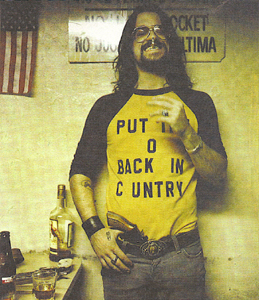![[Metroactive Music]](/gifs/music468.gif)
[ Music Index | North Bay | Metroactive Home | Archives ]
Southern Men
Jennings junior and others revitalize Mason-Dixon music
By Karl Byrn
In its heyday, Southern rock was a force. Energized by the big three that made it a classic-rock canon--the Allman Brothers, Lynyrd Skynyrd and ZZ Top--this '70s genre included a horde of other popular acts, such as the Marshall Tucker Band, .38 Special, Black Oak Arkansas and the Outlaws, all of whom filtered the heavy guitar lessons of the British Invasion through the regional roots music now known as Americana.
This roots-rock mix naturally boasted a heap of "the South's gonna do it again" pride. But Southern rock never really did it again. For the next two decades, the genre yielded only two significant bands, the Georgia Satellites and the Black Crowes, both of whom have proven to be one-hit wonders.
Southern rock was a bygone style until the Drive-By Truckers, whose 2002 genre classic Southern Rock Opera sparked new interest in the style from the alt-rock and alt-country worlds. The Truckers are a new breed of Southern rock; their indie-rock experience digs into regional roots while their keen songwriting re-examines the redneck mentality.
Is a Southern rock revival starting to brew? Not yet. Outside of the Drive-By Truckers, most alt-country acts aren't even from Dixie, nor are they about anything genuinely Southern. It's not in roots-rock, but in new country music that an emerging crossroads approaches Southern rock. Country charts are filled with stars like Keith Urban, Gretchen Wilson, and Big and Rich who rock their neo-honky-tonk with rowdier guitars and sassier attitude.
At what point does new country become new Southern rock? That depends on where it intends to go. Country music is fundamentally about a sense of resignation, while rock music rejects the status quo. New Southern rock begins when new country uses cutting-edge guitar dynamics to signify rebellion, or when regional authenticity collides with worldliness.
Shooter Jennings wants to break the rules. He's the son of '70s outlaw giant Waylon Jennings, and his debut, Put the 'O' Back in Country (Universal South), plays the country audience both ways. He repeatedly tells the Nashville hit system that it sucks, but does so with a crude slogan of redneck populism. Though his stance is all redneck, Jennings' approach isn't. He indeed revives his father's rugged outlaw country sound, but the most natural cuts suggest he grew up loving FM rock.
In the chorus of the sweet, garage-rocking "4th of July," the character only chooses to put on a George Jones disc after playing Ted Nugent on endless repeat. On the barreling-down-the-road tale "Busted in Baylor County," Jennings gives the members of Black Sabbath co-writing credit even though he uses less than eight bars of their famous "Sweet Leaf" riff.
Cameos by George Jones and Hank Williams Jr. are comic rather than musical, but Jennings finally rejects everything. "Lonesome Blues" isn't resigned to lost love, but is dissatisfied with free living. "This counterculture cultivates an emptiness inside," he later notes on "Sweet Savannah," almost holding at bay all he's just honored.
The Van Zant brothers act like rebels but don't reject much. These rocker siblings have an established history: Johnny replaced elder brother Ronnie as singer in the post-plane-crash Skynyrd, and Donnie founded .38 Special. They've collaborated on the very mainstream Get Right with the Man (Columbia), a disc loaded with stadium-guitar boogie and big-drum bluster, but is being marketed as country. That's the right business move; Van Zant courts rednecks with none of Jennings' complexity.
Get Right with the Man also slathers on the tough-guy clichés, particularly the myth of the bad-ass who repents and is redeemed by a sweet mama on a pedestal. Tasty organ, lap steel and vocal harmonies at least bring the music close to home. But the brothers offer a few hidden twists to their good-ol'-boyisms. On "Takin' Up Space," their champion of take-no-shit individualism is a woman who gets a Ph.D. On the lovely hit "Help Somebody," their beloved grandmother isn't a graceful Southern belle, but a pistol from New York City.
Why should we care about new Southern rock anyway? Because right now, our nation is steered by a small minority of Southern religious extremists. But that topic belongs in another article--or on the next biting Southern rock record.
[ North Bay | Metroactive Central | Archives ]
Copyright © 2005 Metro Publishing Inc. Maintained by Boulevards New Media.
![]()

Dewd: Shooter Jennings, assuredly reflecting here on Proust.
From the July 13-19, 2005 issue of the North Bay Bohemian.